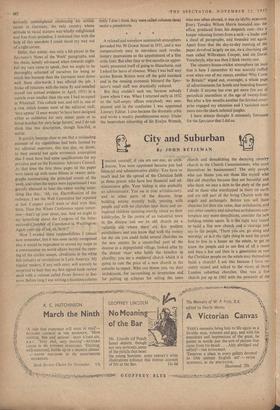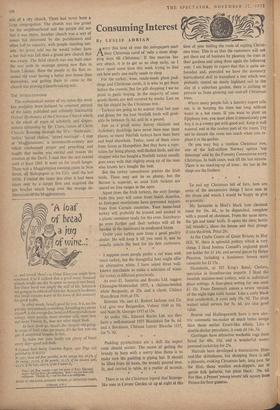City and Suburban
By JOHN BETJEM AN
INIAGINE yourself, if you are not one. an arch- deacon. You were appointed because you had financial and administrative ability. You have as much zeal for the spread of the Christian faith as those priests who have less financial and ad- ministrative gifts. Your bishop is also probably an administrator. You see in your archdeaconry, and in other parts " of the diocese, large building estates recently built, teeming with people and with no chUrches near them and un- baptised children spinning merrily about on their kiddicycles. In the centre of an industrial town in the diocese you see an old church on a valuable site where there are few resident pariShioners and you know that with the money for the site you could build several churches on the new estates. In a countrified part of the diocese in a depopulated village, looked after by the distant vicar who holds the benefice in plurality, you see a mediaeval church which it is going to cost the price of a new church in the suburbs to repair. Who can blame you, my dear archdeacon, for succumbing to temptation and for putting up schemes for selling the town
church and demolishing the decaying country church to the Church Commissioners, who must themselves be businessmen? The only people who can blame you. are those like myself who like old churches because they are beautiful and who think we owe a debt to the piety of the past and to those who worshipped in them on earth and are still part of the living Church with the angels and archangels. Before you sell these churches for their site value, dear archdeacon, and you other country and suburban archdeacons con- template any more demolitions, consider the neW building estates again. Is it the right way round to build a fine new church and a vicarage and say to the people, 'There you are, go along and worship,' or is it the right thing to send the priest first to live in a house on the estate, to get to know the people and to use first of all a room and then a but and then in a generation or two the Christian people on the estate may themselves build a church? I ask this because I have re- cently visited and talked to the vicars of three London suburban churches. One was a fine church put up in 1903 with the proceeds of the sale of a city church. There had never been a large congregation. The church was too grand for the neighbourhood and the people did not feel it was theirs. Another church was a sort of nissen but decorated by the parishioners and often full to capacity, with people standing out- side. Its pri:st told me he would rather have a but that was full than a grand new church that was empty. The third church was one built since the war with its vicarage among new flats in South London. Here the people in the flats re- sented the vicar having a better new house than themselves, and getting them to come to the church was proving a heartbreaking task.
THE M LJGGLETONIANS The ecclesiastical nature of my notes this week has prohably been induced by constant..perusal of the lately published and infinitely fascinating Oxford Dictionary of the Christian Church which is the result of years of scholarly and dispas- sionate editorship by Dr. Cross, canon of Christ Church. Running through the M's-H‘lithraism,' `mitre,' mixed chalice,' mixed marriage'--I stop at 'Muggletonians,' a seventeenth-century sect which condemned prayer and preaching and taught that matter was eternal and reason the creation of the Devil. I read that the sect existed until at least 1868. It went on for much longer. There was a Muggletonian meeting room in New Street, off Bishopsgate in the City, until the late 1920s. I visited the room just after it had been taken over by a carpet firm and acquired the gas bracket which hung over the strange de- liberations Of the Muggletonians.











































































 Previous page
Previous page